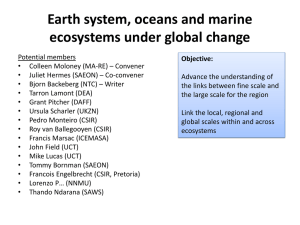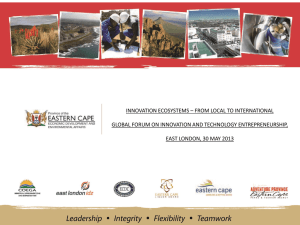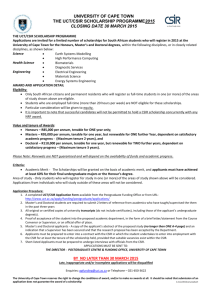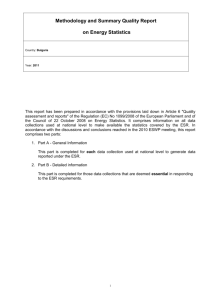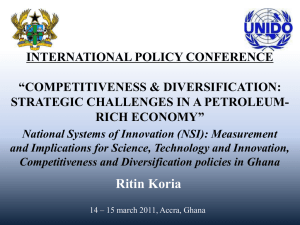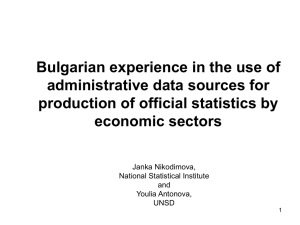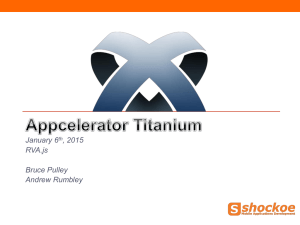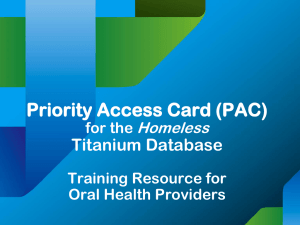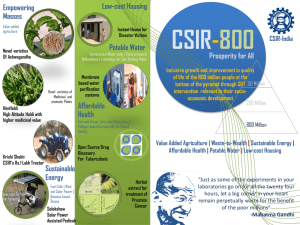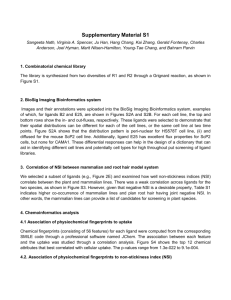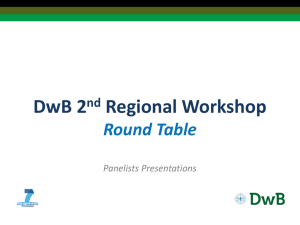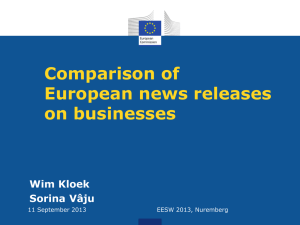DST - HESA
advertisement
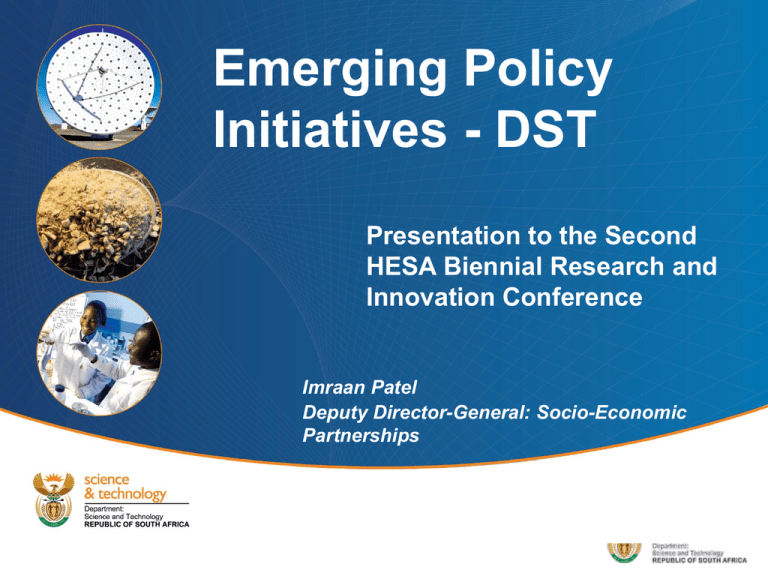
Emerging Policy Initiatives - DST Presentation to the Second HESA Biennial Research and Innovation Conference Imraan Patel Deputy Director-General: Socio-Economic Partnerships Contents • Evolution of the Research, Development, and Innovation Policy Package • Policy Priorities • Human Capital Development and Knowledge production • Knowledge Exploitation and Innovation • Strengthening the National System of Innovation Policy Package • S&T White paper • National Research and Development Strategy (NRDS) • Ten-Year Innovation Plan (TYIP) • New Growth Path • National Development Plan • Sectoral Policies NSI SWOT Benchmarked New public S&T missions Biotechnology ICT Advanced manufacturing Astronomy Developing the NSI Creation of DST R&D Strategy S&T missions 2002 10Yr Innovation Plan Knowledge-based economy Grand challenges Human capital development S&T White Paper 1996 OECD Review of SA NSI Comprehensive Policy Implementation 2004 2007 2009- S&T White Paper • The concept of the National System of Innovation (NSI) as underlying and main idea • NSI was coined to ensure that system’s activities focus beyond science and include technology development and innovation National System of Innovation • Few decades ago “innovation” meant something closer to “invention” • Today, the focus is on how to exploit invention for socio-economic benefits • Hence, a System of Innovation as opposed to the Science System • A Science System is a necessary foundation from which to build a National System of Innovation Enabling Conditions • The White Paper also identified leadership, coordination and cooperation as critical factors to the development and effectiveness of NSI • The role of government was identified as having to see to it that different components of NSI are “in place, are interacted, and that there are agreed set of goals and objectives”• How far have we progressed or succeeded? R&D strategy • NRDS rests on 3 pillars. • Innovation • Human capital development-including transformation of ‘frozen demographics’ and • Creation of an effective government STI system and infrastructure R&D strategy (2) • Identified technology missions and science platforms • Science Platforms (Astronomy, African origins Platform (paleosciences), Biodiversity, Indigenous Knowledge System [IKS] and Antarctic research) • Technology Missions (Advanced Manufacturing, ICT, biotechnology, resource-based industries) • Proposed a target of 1 % expenditure on R&D of GDP Mastery of Technological Innovation • Initially, DST put the following building blocks: • • • • • Innovation Fund. Biotechnology and BRIC’s Cyclotron project (BioPad) Citrogold SA project (Plantbio) Tshumisano • Integrated into the Technology Innovation Agency (TIA). Mastery of Technological Innovation • Poverty Alleviation – Aquaculture, essential oils, agronomy science etc • Advanced manufacturing technology (AMTS) – Biocomposites, Fluorochemicals expansion initiative • ICT • Resource Based Industries and knowledge based industries • Advanced metals initiative Ten-Year Innovation Plan • Transition to knowledge based economy (KBE) – embed NSI derived knowledge into socio-economic activity • The Grand Challenges as areas for enhanced focus • Deepen the section on mastery of technological innovation • • • • • Intellectual Property (IP) for Publicly Financed Institutions – ACT. National Intellectual Property management Office (NIPMO) Offices of Technology Transfer (OTT’s) TIA Centres of Competence (CoCs) Human Capital Development and Knowledge Production • General and targeted • Centres of Excellence • South African Research Chairs Programme (SARChI) • Infrastructure • International • Regional and continental programmes Supported Postgrads – CoE’s Total number of postgraduate students (masters and doctoral) supported from 2004 to 2010. Doctoral Graduations (CoE) The total number of Doctoral graduations from 2004-2010 Masters Graduation (CoE) The total number of Masters Graduation from 2004-2010 Peer Reviewed Publications (CoE’s) The total number of Peer Reviewed Publications from 2004 -2010 Knowledge Exploitation and Innovation • R&D-led industrial development • Model Development and experimentation • Centres of Competence • Community University Partnership Programme/ Risk and Vulnerability Science Centres • Well defined national roadmaps SA Ti Industry Market Development Supplier Development Industrialisation & Commercialisation Technology Development Primary Titanium Metal Production Powder Based Processing of Titanium Investment Casting of Titanium CSIR Mintek UP, Necsa Thermtron CSIR NIMS (Japan) ULIM, WITS, SU Mintek, CUT, NLC CSIR UCT US Boeing Machining of Titanium US UJ UCT CSIR Additive Manufacturing of Titanium CUT NLC Aerosud Joining of Titanium NMMU NLC CPUT Forming of Titanium (Later) Physical Metallurgy of Titanium: UP, UCT, UKZN Simulation and Modelling: ULim(Ab Initio), CSIR(FEM, ProCast, Ab Initio), UCT(FEM, Proc. Mod.), CPUT(Weld Sim), UKZN Laboratories & R&D Facilities: CSIR, UCT, UP, US, NMMU, CUT, Mintek, Necsa, NLC R&D Platforms TECHNIQUES AND SYSTEMS MATERIAL-BIO COMPOSITES INFORMATION TECHNOLOGY Carbon Calculator Temperature management Citrus Academy DVD Electronic data flow Packaging Shipping containers Green packaging Mobile rapid cooler Bio-degradable Materials Citrus pack house handling Chromo meter measurements BIOTECHNOLOGY CHEMICAL TECHNOLOGY ENERGY & ENVIRONMENTAL TECHNOLOGY Audit system of energy Tonnage off Tar Temp & Humidity Management Organic fertilizers Fruit Preservation GRAS Chemicals Waste coating Flower preservations Elevated storage temp Plant extracts & essential oils System Development • • • • Improved Co-ordination Financing and resourcing Incentives (private sector and international) Partnership models Re a leboga Ro livhuwa Siyabonga Siyathokoza Thank you
